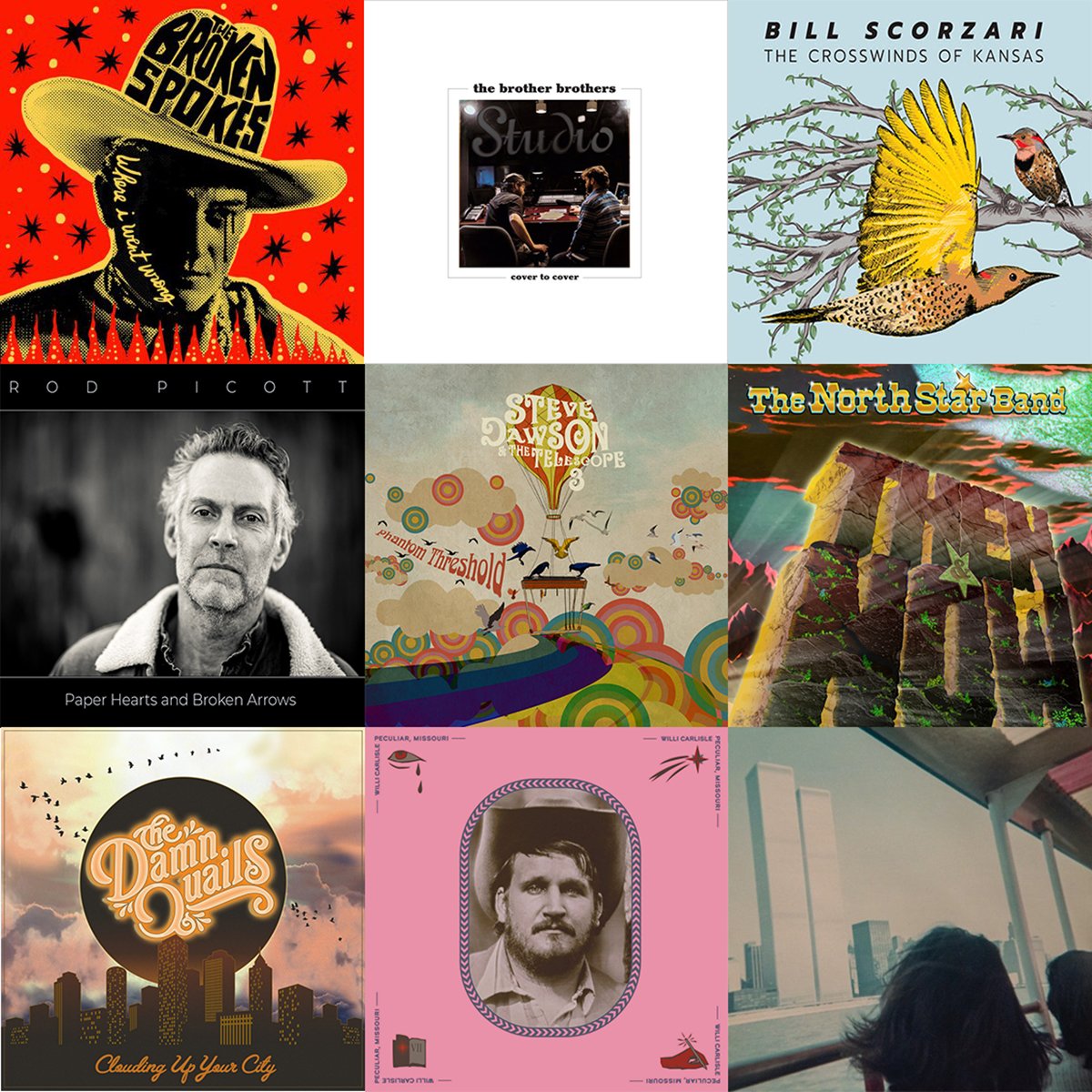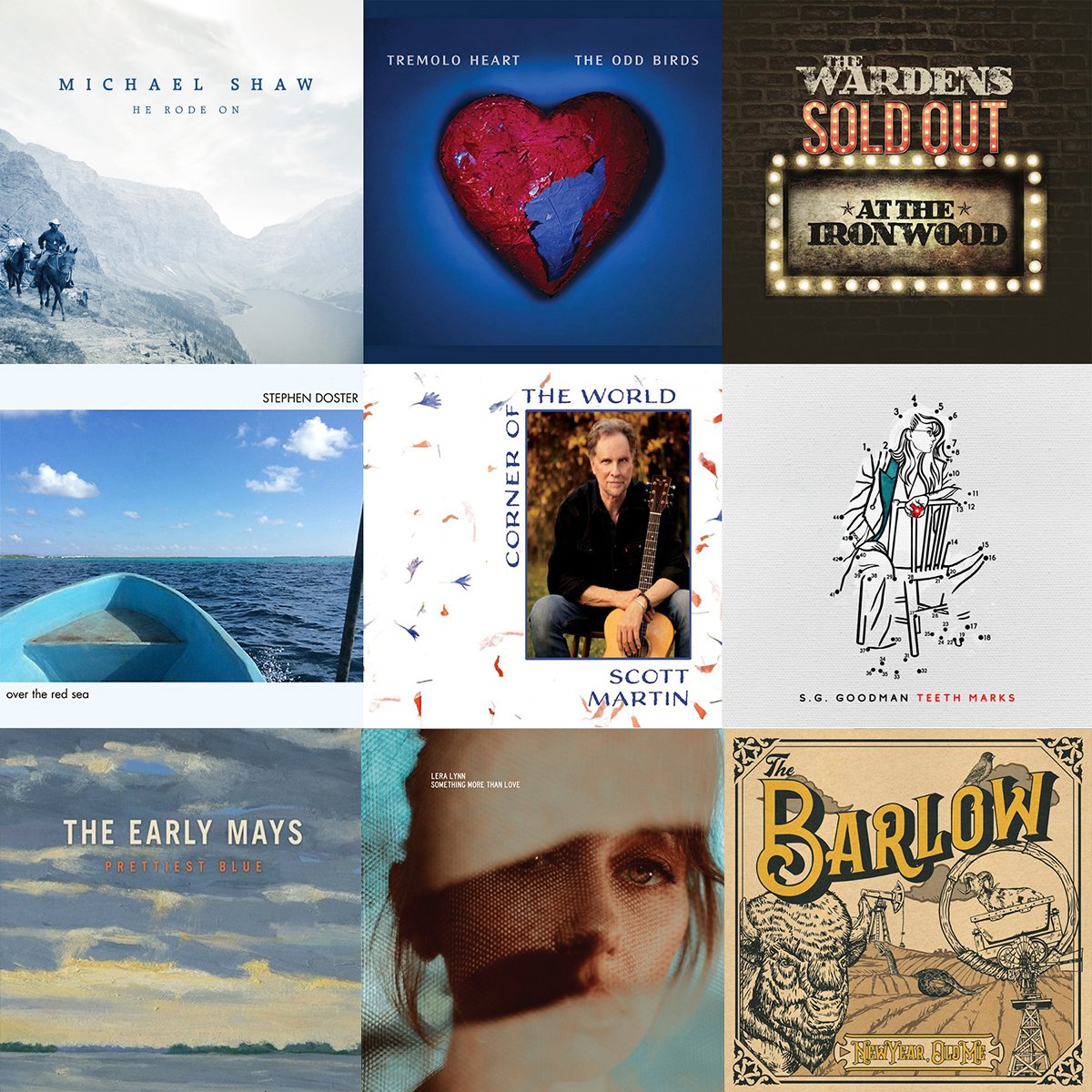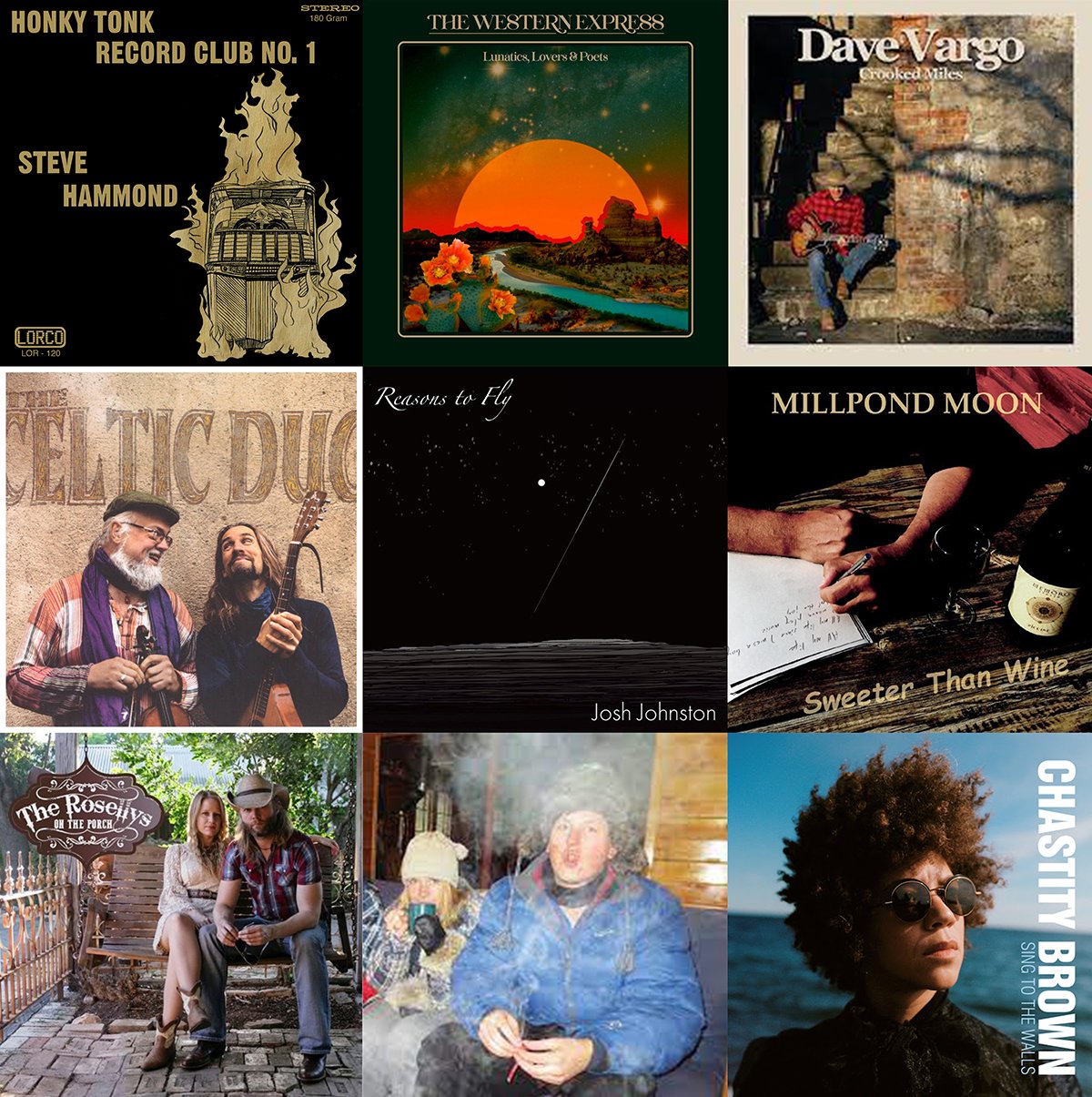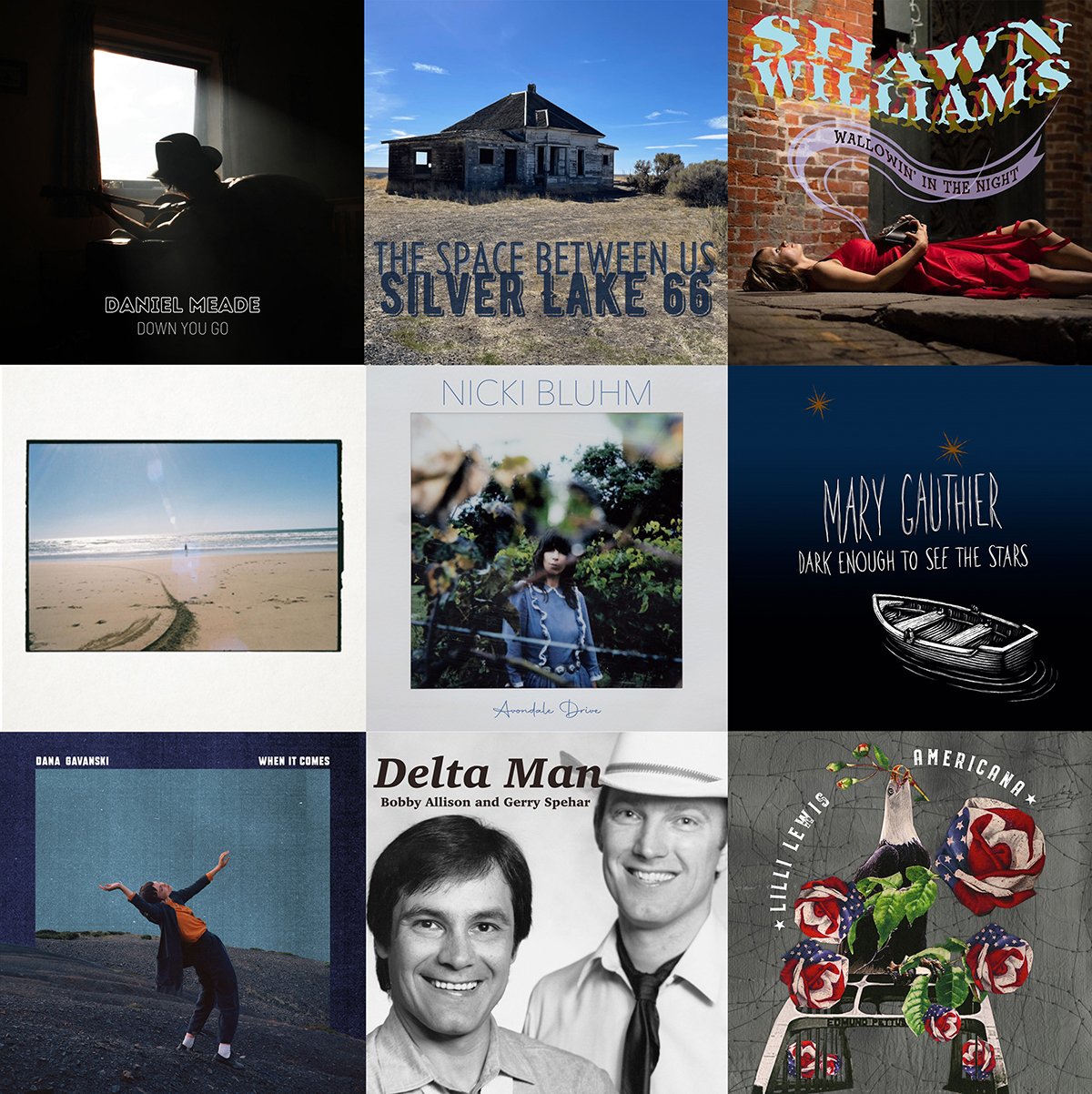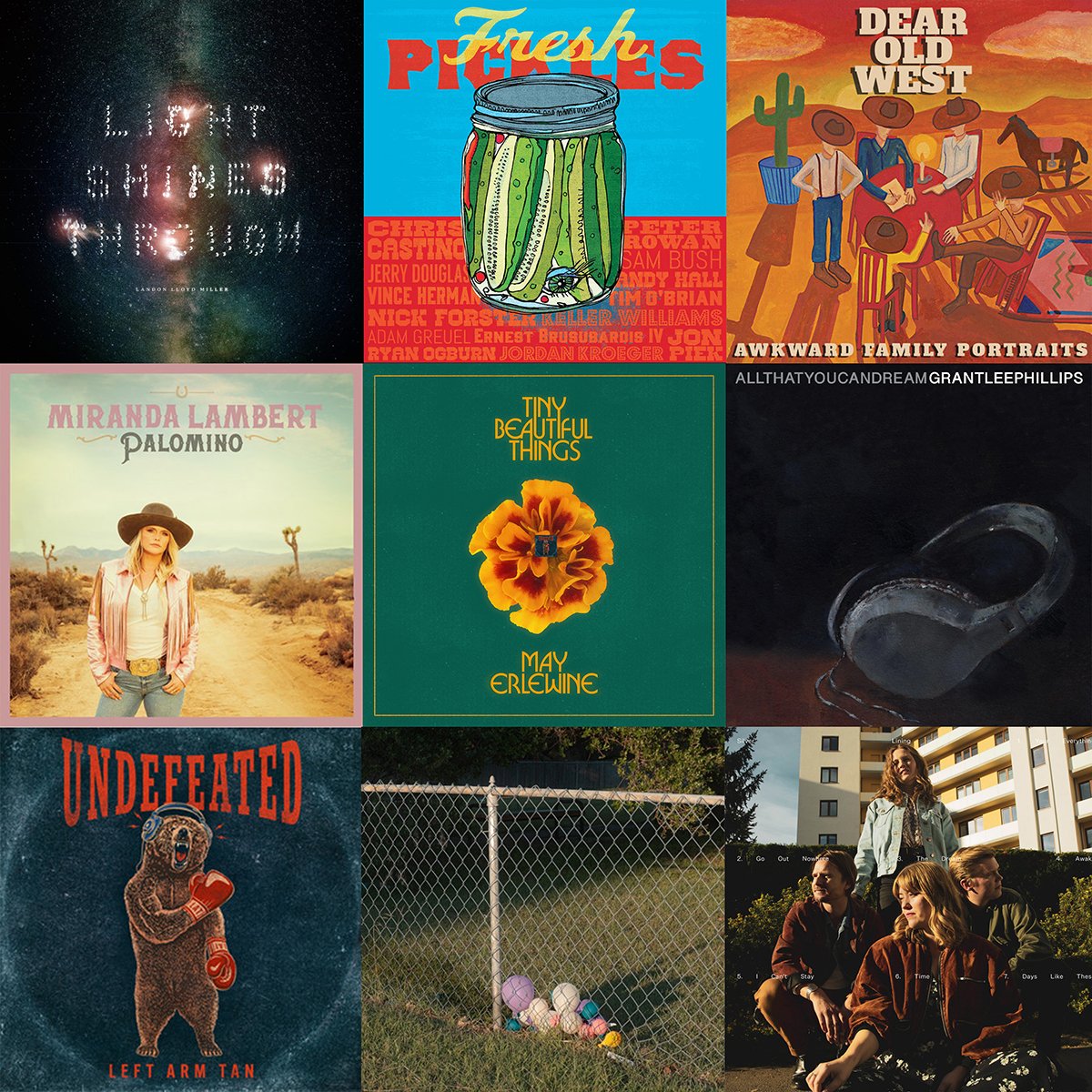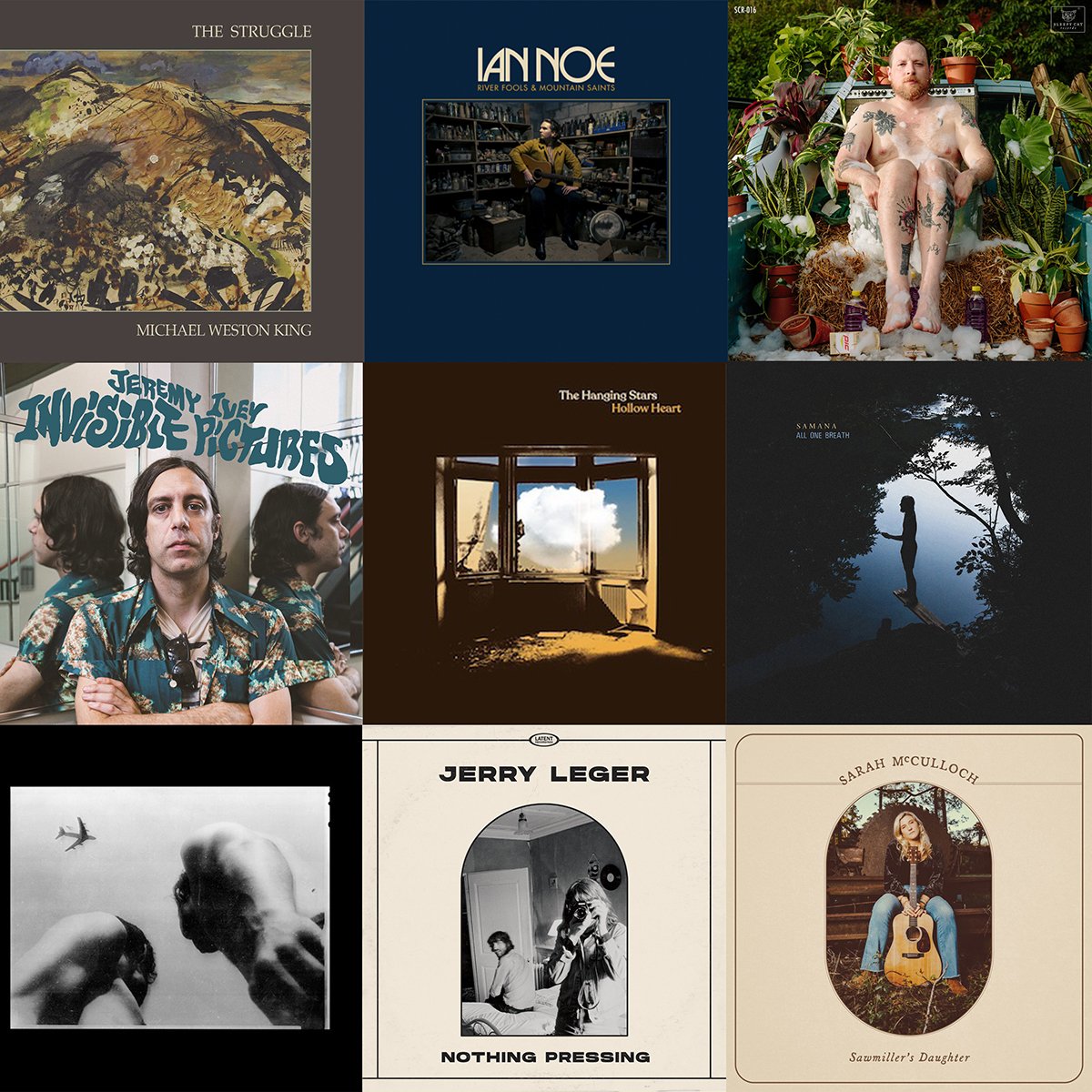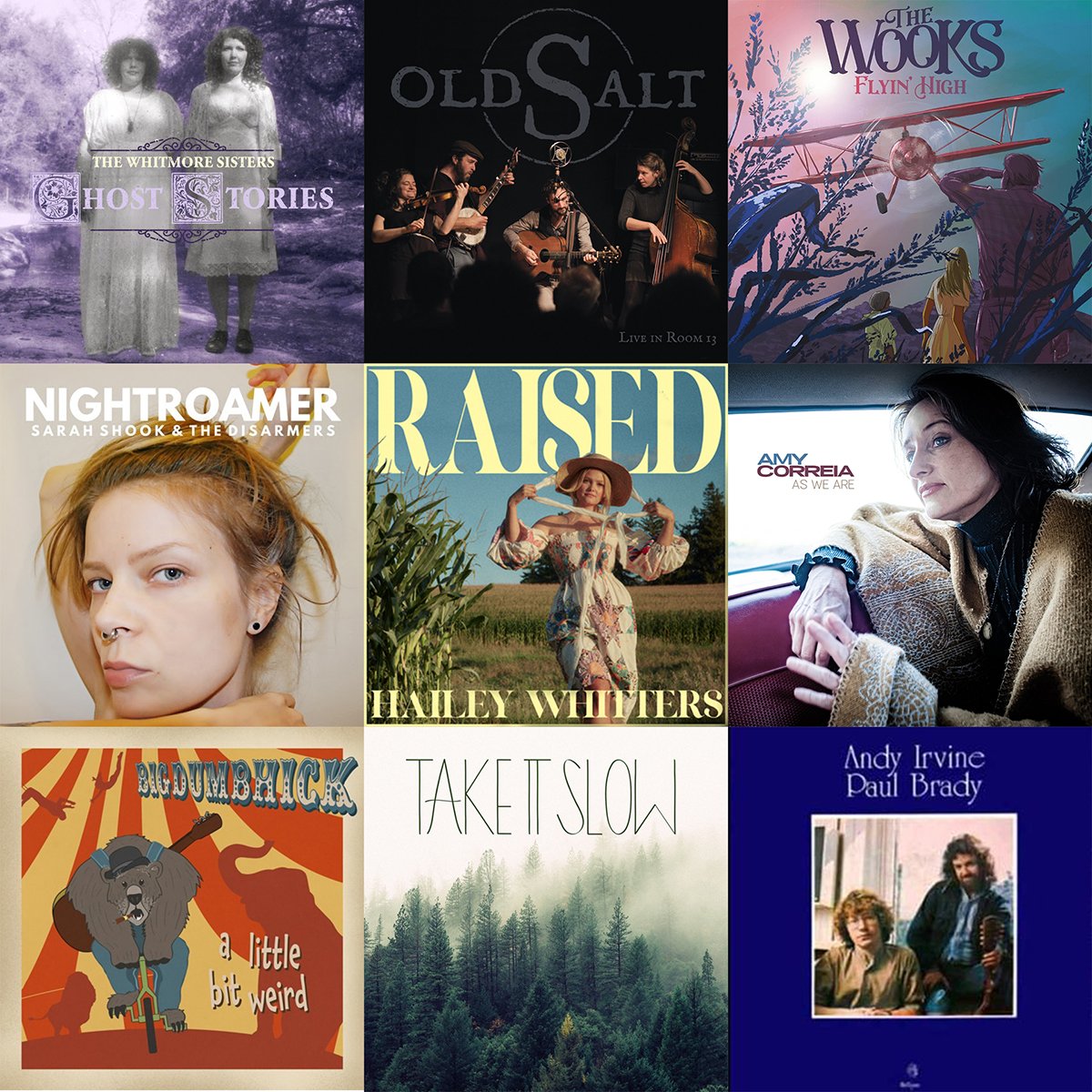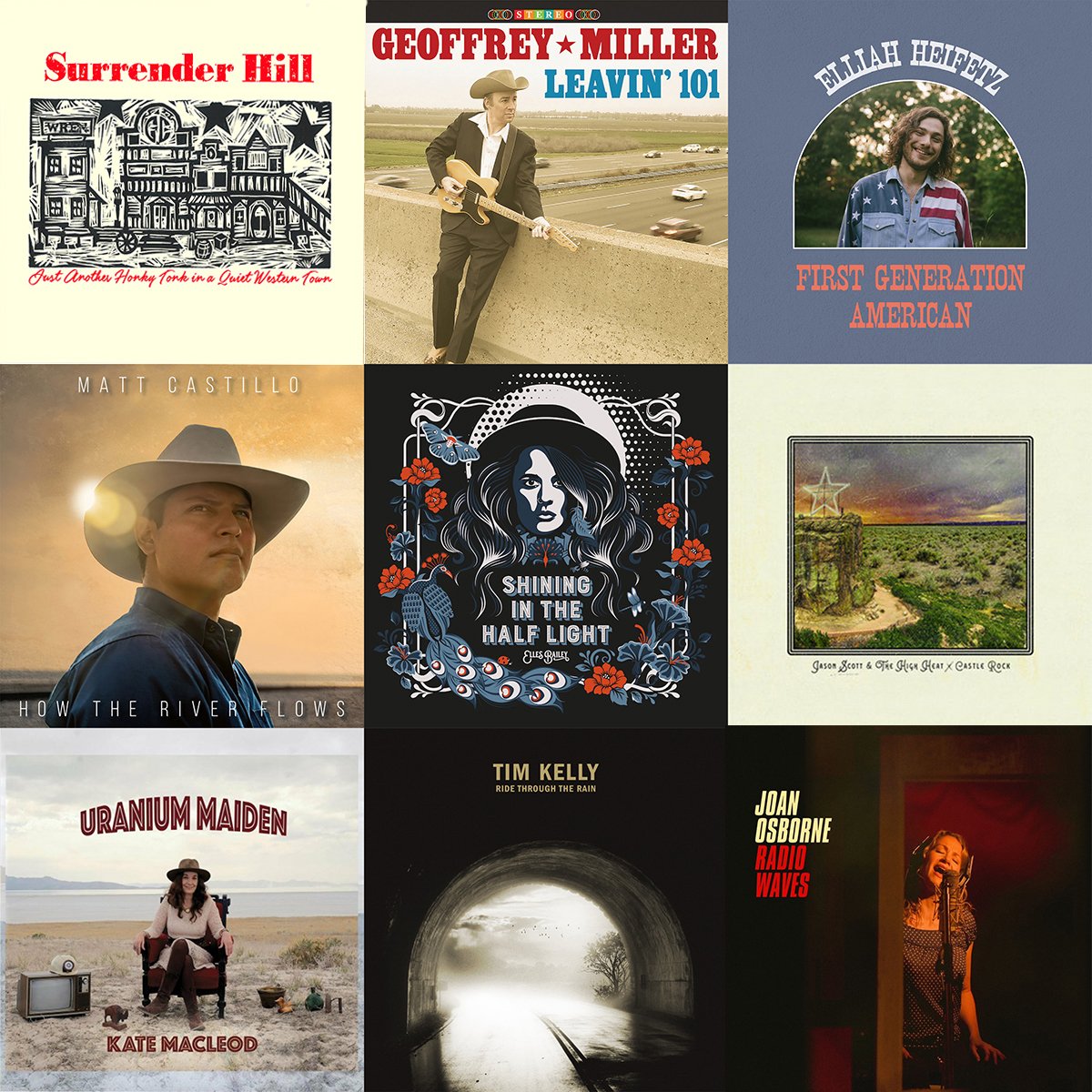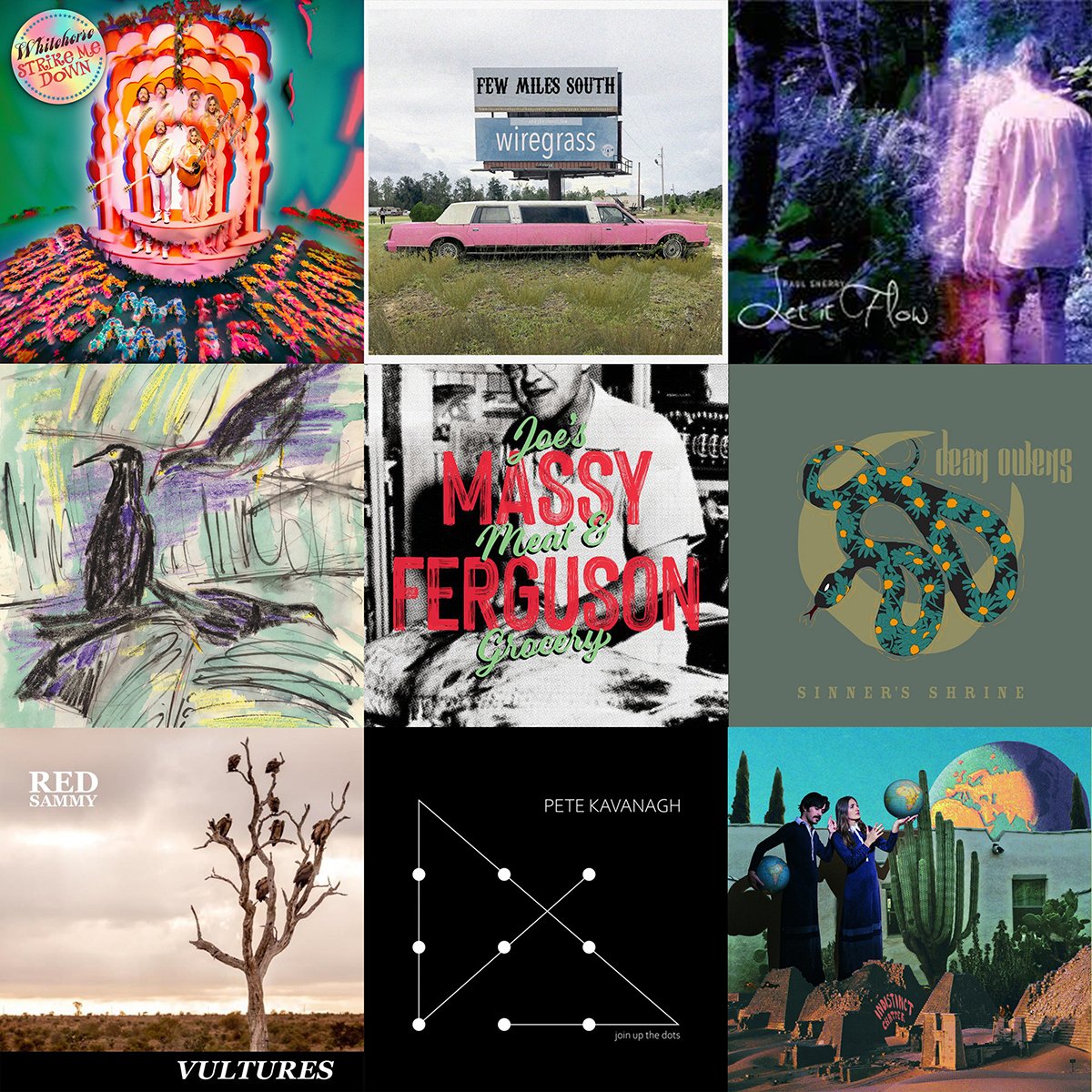Hannah Read & Michael Starkey Cross The Rolling Water Hudson
Hannah Read started playing traditional fiddle as a child on the remote Scottish Isle of Eigg, when she divided her early years between there and Edinburgh. In love with traditional and folk music, and later classically trained, she was also heavily influenced by her father’s eclectic music collection that comprised everything from African music to Americana. She went on to study fiddle and guitar at Berklee, where she was a room mate of Sarah Jarosz. She now continues to be immersed in old time and stringband music in Brooklyn, NY but met Edinburgh based clawhammer banjo player, Michael Starkey, on a visit home in 2019. Although they had never played together before, the pair hit it off musically, culminating in the Scottish recording of this lovely old time fiddle and banjo duet album in 2020.
Sounding like they’ve been playing together for years, this is a collection of eleven old and new instrumentals and two songs. Starkey’s two original compositions, the jaunty banjo led Blue River and the guitar based Leonard’s Blues blend seamlessly with the older tunes. Read brings an original slow waltz, Waltz de la Funguy (there must be a good story behind that one) and they encourage spirited barn dancing on fiery numbers like Charleston, North Missouri Wagoner and Old Kentucky Whiskey. Their choice of tunes are not the obvious old timey standards, and they acknowledge their sources in the attractively designed digipak. Read switches to guitar for a beautiful rendition of Anais Mitchell’s Shenandoah, her sweet breathy vocal being the perfect instrument to express the pain of unrequited love. They reprieve the song again later as an instrumental. The sentiment of Allen Reynold’s (via Doc Watson) Ready For The Times To Get Better will not be lost on any listener in the current climate, again sung superbly by Read, with backing vocals from Starkey.
Recommended, both for existing devotees of old time music, but also as an introduction for the curious.
Review by Eilís Boland
Long Way Home A Few Favorites Self Release
Long Way Home are a transatlantic duo who have made County Cork their home, luckily for the roots music fraternity in Ireland. Kylie Kay Anderson was raised in Utah, USA where she was introduced to music at young age by her father. Eventually choosing the mandolin as her main instrument, she progressed to studying on the ETSU (East Tennessee State University) Bluegrass, Old-Time and Country Music Studies degree course. Meanwhile in Drenthe, The Netherlands, a young Owen Schinkel quickly became hooked on bluegrass after first hearing it as a teen, picked up a dobro and ‘hasn’t put it down since’. This led him to enrol at ETSU (having been awarded a scholarship there) on the same sought after course as Kylie Kay. After completing their studies, the two relocated to Cork where they are enjoying continuing to pursue their musical interests, promoting bluegrass and roots music and absorbing many other influences.
This 4 track EP is a calling card for their sound, with well chosen early country and bluegrass songs which clearly reflect their influences. Flatt & Scruggs recorded the first version of I’ll Go Steppin’ Too in 1953, and here it allows Owen to showcase his undoubted prowess on dobro (resonator guitar), while he harmonises with Kylie Kay’s lead vocals on the uptempo tale of ‘if you can go out on the town, then so can I’. Cry Cry Darlin’ was a staple slow waltz in Bill Monroe’s repertoire in the early days of bluegrass, and here Long Way Home perform it as a ‘call and response’ song, with some tender mandolin fills from Kylie Kay. A song recorded by Webb Pierce in 1953, Walkin’ The Dog gets the duo treatment, with Kylie Kay on guitar backing up Owen’s lead vocals and dobro breaks. Finally, the Carter Family’s Will You Miss Me? is sung by Owen, with Kylie Kay’s alto vocals perfectly complementing his. I hope this short EP is a harbinger of more recordings to come from this talented pair, who are really just at the start of their musical journey. Some new compositions would be very welcome next time!
Review by Eilís Boland
The Lucky Ones Slow Dance, Square Dance, Barn Dance Self Release
The Canadian band’s previous eponymous debut album set out their credentials for vibrant old-time/folk and bluegrass music that is built upon with this new release which, as the title predicts, is very much aimed at the barroom dance floor. To help further that sense of energy, the album was recorded in the Anglican Church Cathedral in the region of the Ta’an Kwach’an First Nation in Canada’s Yukon Territory. The songs on the album are largely original and feature the four band members, with some six additional musicians adding to the general ambience of the occasion.
All of the songs have the air of older, traditional storytelling songs. This allows various members to take the lead vocal, with others joining in on the harmony and choruses as required. If the inner sleeve collaged image of the players is anything to go by, the assembled players had a good time getting the music across to live audiences as well as for the recording. It’s acoustic music with guitars, upright bass, banjo, mandolin, accordion and fiddle to the fore in a group context that also allow the individuals to shine. The end results are as rewarding for the listener as for the band.
The opening song Kate And Dan is a tale of two characters who take what they need in a trail of robbery and retribution, as their lifestyle ends without either life or any particular style. This is followed by a jaunty instrumental Broken Bow Stomp that is forceful in intent. The iron road gets a run out on Goodbye Train, a song about taking a consort away. Keno City Love Song recalls John Prine in its overall tone and lyrics, which are reminiscent of the great man’s work - but in a good way. A romance that relates to alcohol is set on a barstool in Fifth Of You. Another solid but melancholy tale is that of the now buried Jake - this one’s a slow dance. In a similar frame of mind but a different context is Bones. More positive is My Gal Is Good To Me which relates just that feeling to the album’s closing song. There’s a seemingly outlying connection to these isles, or perhaps its more universal, in Red The Skies which connects the sky colour and potential climate to the good fortune (or perhaps misfortune) of those who look that way before venturing out.
The band consist of Ian Smith, JD McCallen, Ryan James West and Kieran Poole but they are ably joined by the guests here who give added resonance to the tenor of the tracks. No matter which dance you want to take, The Lucky Ones sound like a good dancing partner here.
Review by Stephen Rapid.
Luther Black and the Cold Hard Facts Moment of Truth Wire & Wood
There is something of Bob Dylan’s early band recordings acting as a reference point in this new set of songs from the band fronted by Rick Wagner, who wrote all the songs bar the cover of the aforementioned Mr Dylan’s Most Of The Time. Wagner has a suitable soupçon of grit to his voice that feels appropriate for this set of songs’ search for meaning, love and life enforced wisdom. Many of these songs were written during lockdown and that, in some ways, allowed for an inward looking album of more personalised writing. Wagner also produced the album and played many of the instruments and then, within the protocol of lockdown, added a major contribution from band member Matt Wissler on guitar, mandolin and vocals. He also got others to add to the songs, including guests such as Will Rigby on drums and Andy Riedal on pedal steel for one particular song, among others providing percussion, backing vocals and violin.
There is a certain melancholy and air of restraint pervading the album overall. Very few of the tracks are uptempo and most are built around a bedrock of acoustic guitars and subtle rhythms. The final track Heartbreak Lullaby had its genesis when Wagner was playing his guitar contemplating the recent death of John Prine. Prine is one of many influences and touchstones to the writing that includes the likes of those iconic writes as Guy Clark, Townes Van Zandt as well as Ray Wylie Hubbard, acknowledged as a major inspiration and, doubtless, Blaze Foley should get a mention here too as Wagner has called his publishing company Drunken Angel Music. I also hear, to these ears, a comparison to the work of the much underrated Elliot Murphy.
The album opens with a short atmospheric instrumental America’s Moment (there is a second soundscape later with The Pilgrim’s Plight), which leads straight into Long Way To Go, a working man’s story of carrying on carrying on in a search for some truth in that existence. From there on there are many moments (of truth) to savour in the understated delivery of the assembled team which, as producer, Wagner in the recording situation was able to monitor and mix. There are many songs that have a strong likeability factor including Before I Stop Loving You, Take Me Back, and Alamo Way which has a nice use of the guitar and backing vocals of Brandi Thompson and Dina Regine. Others like Hold On To Your Dreams have a featured violin that adds to its sense of retrospection.
These songs are pretty much Wagner’s reflection of a particular time and place and his use of The Cold Hard Facts brings out a sense of that, with implicit adherence to its vision of that truth.
Review by Stephen Rapid
The Vandoliers Self-Titled Self Release
The pandemic was not the only catastrophe that landed on the doorstep of the Texan band The Vandoliers in 2020. Signed to Bloodshot Records in 2019, they released FOREVER, their third album and their first album on that label, and had recorded the material for this self-titled album in 2020, which was also to be supported by Bloodshot. Everything was looking rosy in the garden, supporting slots with Flogging Molly, The Turnpike Troubadours and Lucero and a scheduled tour of Europe all pointed towards a band very much in the ascendency. However, the pandemic and the demise of Bloodshot left them without a label, off the road, and with the material recorded for an album that was to see the light of day in 2020. Left with two choices, to either throw in the towel or regroup and create their own record label, they chose the latter.
Frontman and songwriter Joshua Fleming also became a father in late 2020, and, as he confessed to Lonesome Highway in a recent interview, he ‘grew up a bit more during that period.’ Returning to the studio with additional material, they put the finishing touches to an album that unequivocally defines The Vandoliers, blending soaring ‘in-your-face’ rockers with a few forays into less breakneck raucous numbers.
Describing themselves simply as a Texas band, they recall the cowpunk sound of the late 70s and early 80s, with nods in the direction of Meat Puppets and Jason & The Scorchers. With a history of playing in punk bands, Fleming and his bandmates, bassist Mark Moncrieff, drummer Trey Alfaro, fiddler Travis Curry, electric guitarist Dustin Fleming, and multi-instrumentalist Cory Graves, fully recreate the energy and verve of their live shows on the album.
They’re out of the blocks in fine style with opener The Lighthouse and Every Saturday Night, which follows, perfectly exemplifies their core sound and spark. Equally dramatic is the fiddle led and first single from the album, Howlin’, another example of the band’s capacity to create songs that are tailor-made for the live stage. Tingling piano introduces the swinging rockabilly vibe of I Hope Your Heartache’s A Big Hit, before they close out with the twanging country toned Wise Country Friday Night.
A giant leap forward from their previous recordings, the album entirely nails where The Vandoliers are coming from. It’s also a huge statement from a tight-fit and fearlessly hard-working band that deserves all the success that they are inevitably going to achieve going forward. Check it out and make sure you get to see these guys on stage if they’re passing your way.
Review by Declan Culliton
Andrew Duhon Emerald Blue Self Release
The fourth album from Grammy-nominated singer songwriter Andrew Duhon combines his memoirs of travelling solo on the Pacific Northwest and his homelife in New Orleans. An artist that can boast a number of strings to his bow, Duhon performs solo, with his band The Andrew Duhon Trio, and is also the brainchild behind New Orleans’ BreakFest, the Sunday morning pre-jazz music and breakfast event of Jazz Fest.
Arriving nine years after his last recording THE MOORINGS, his latest project is an eleven-track group of very ‘easy on the ear’ songs. That’s not to suggest that Duhon’s songwriting is anywhere approaching lightweight. On the contrary, his songs deeply explore life’s continuing challenges and the search for a perfectly balanced lifestyle, while remaining true to oneself and one’s loved ones.
The opener Promised Land considers and questions these concerns, setting the theme for what’s to follow. Lost love and the sorrow of breaking up are articulated on the stripped back Southpaw and the soulful Diggin’ Deep Down recalls past and often unwise life choices and rehabilitation.
Other highlights include the title track, Slow Down, and the closer As Good As It Gets. Alongside Duhon, who plays electric and acoustic guitars, are Dan Walker on keys and accordion, and Jano Rix on drums and percussion. They all contribute to an album that offers a comforting suite of soothing tracks from an artist who directs himself towards self-examination for inspiration.
Review by Declan Culliton
Jordi Baizan The Love In You Berkalin
On this third album, Texan songwriter Jordi Baizan sticks closely to the formula that made his last outing, Free and Fine (2019), such a success. He again uses the production team of Walt Wilkins and Ron Flynt, recording at Jumping Dog studios in Austin. It’s a wise choice to also ask Chip Dolan to return to the same studios and his contributions on piano, wurlitzer and electric keyboards are a key ingredient in the relaxed melodies that permeate these eleven songs. Co-producer Ron Flynt also adds B3 organ, harmonium, and bass on two songs, plus piano on another. Bart De Win also returns on accordion for one song and both Tina and Walt Wilkins contribute harmony vocals.
The new rhythm section of John Chipman (drums, percussion) and Harmoni Kelley (bass), sit quietly in the pocket and support the songs in an understated way throughout. Particularly striking is the track, Looking For A Heart, a poignant tale of a donor whose early death gives life to another in need; beautifully observed and gently delivered. The Way Of the World is a considered tribute to a child and the manner in which a life is formed and directed. The memory of being asked to help a homeless man on the street is honestly captured, as the parent chooses to not act on the humanity shown by the child in asking for a kindness to be shown. We all make our choices in the moment.
Fathers also feature in the song, A New World, along with a sense of hope for the future . A look towards the new generations and the legacy left behind by those who tried to find a better way, and a sense of passing the baton along the line.
Similarly, the closing song, Take Your Time, is sung to a baby in the womb and the message that the arrival of a new life in the world will be both a joy and a chance to bring more loving awareness to the world. Baizan has a sweetly alluring vocal and the sensitive ensemble playing make this album a very pleasant listening experience. Much to recommend and another step forward in this artist’s career.
Review by Paul McGee
Kaurna Cronin Harsh Beauties Self Release
This Australian artist has delivered album number seven and his music has been described as the sound of contemporary Australian folk music. Cronin is a globally-recognised performer with a strong touring ethic, and in 2021 he was awarded Artist Of The Year at the Australian Folk Music Awards.
During the two years of Covid shutdowns, with live music no longer a possibility, Cronin has had time to recalibrate and assess where he finds himself in the current scheme of things. He has always been very environmentally and socially aware in his lyrics; something that he continues to highlight, but there has been a shift in the musical vista. There is a big production sound on this album, with bassist Kiah Gossner at the control desk.
Gone are the use of synthesizers that featured on ALOFT IN BLUE (2020), only to be replaced by both electric violin, courtesy of Frank Giles, and rich organ melodies, with both Dave McEvoy and Matt Morison featuring. Recording took place at two different studios, and Cronin wrote all the eleven songs, ably supported by his regular core group of musicians - Tom Kneebone (electric guitars), Kiah Gossner (bass), Kyrie Anderson (drums, percussion), and Matt Morison (organ, piano). These accomplished players are joined, this time around, by Dave McEvoy (organ, piano), Frank Giles (violin), Stuart Patterson (saxophone), and backing vocals are provided by a mix of Lauren Henderson, Alana Jagt, Kaurna Cronin and Ryan Martin-John, across the various tracks.
The sonic sound is impressive and the musicianship is of a high standard, but the overall feeling is that of a more commercial sound, leaning almost in the direction of contemporary bands like, The Killers. There is no doubting the sincerity of Cronin as he examines some of the issues of our times, and the inclusion of a few relationship songs gives a balance to any fear of over-indulging in social analysis. One song that is suitably different, Why Do You Love Lizzie? questions the Australian leaning towards Queen Elizabeth and the British Empire. Australia is still a constitutional monarchy so there are lingering issues regarding the Queen of England and potentially her role as head of state.
Elsewhere, there are songs that examine relationships, such as Never Said, or One Day Away From You, where life on the road has the writer missing the comforts of home pleasures including a very inventive use of both bottles and a cutlery drawer as percussive sounds by Kyrie Anderson on this track. Equally, I Write the Songs and If the First Time Was the Last Time, both channel personal feelings and the distance that can develop between us, both at an emotional and a physical level.
Our Way is a message that love endures and that we should capture the moment in what lies all around us. A similar message is imparted in the song, As It Comes, As It Goes, where Cronin reflects on holding no regrets, living these days we are given and enjoying the ride. There is frustration on songs like Unknown, where Government indifference seems to fuel a sense of anger. Global environmental concerns are tackled on Keep Me By the Rock, where the fragility of the planet hangs in the balance right now. The speed at which we live and the over-production and over-consumption in society are caught up in the song, Sideways, although the cryptic nature of Cronin’s words and use of language can, of course, lead to other interpretations of what is being said or, indeed, tackled in the song interpretations here.
Finishing on the song, The Hardest Part, is perhaps not the most upbeat way to close the album. Cronin sings of inevitable failure and the loss that will occur among our loved ones in witnessing an upheaval of global proportions, ‘Is it time to make a change? To concede to all the people it was easier to blame, All the indecision, among all the many fails - Forgive me now.’
Always an interesting artist and continually pushing his career into new directions, Kaurna Cronin holds as much in common with other Australian bands, such as Midnight Oil, as he does with the modern pressures of remaining relevant in an ever-demanding world of sonic vistas with hooks, soundbites and commercial considerations.
Review by Paul McGee
Andrew Tuttle Fleeting Adventure Basin Rock
When I reviewed Andrew Tuttle’s previous album, in 2020, I stated that “he produces music that is both hypnotic and soothing, mixing with elements of electronic sound and symbiotic instruments that weave into air and space.” On this, his fifth full album, Tuttle explores a very similar soundscape with the creative genius that is seldom bestowed upon us mere mortals and rarely illustrated with such unique vision.
Written during the constraints of the recent pandemic, Tuttle decided to channel all of the inner feelings that he was experiencing and turn them into musical lullabies to the soul. The beautiful sway of this music brings a soothing balm to our troubled times, while also providing a meditative calm in which we can all simply breathe out and relax our troubled minds.
Using a new set of musical contemporaries, Tuttle calls upon no fewer that fifteen different artists to contribute their parts to what is a completely satisfying whole. He does call upon both Chuck Johnson (pedal steel) and Tony Dupe (cello, viols, double bass) from the previous album, Alexandra. However, their essential inclusion is limited to just a single track in each case. No matter how many digital music files were flying across the world in random patterns, it is the overarching vision of Tuttle who pulls all these disparate strands together from his home studio in Brisbane, Australia.
There are seven tracks that run over forty minutes and their abstract titles belie the true beauty that is contained within. The opening, Overnight’s A Weekend, includes a wash of electronic soundscapes, banjo, violin, guitars and sax in an ethereal mix that conjures up a balmy night in all its quiet glory. The hint of a trip to new undiscovered lands is also in the air.
Elsewhere, the simple pedal steel, acoustic guitar and gentle pulses of New Breakfast Habit are hypnotic while the fuller sound of Next Week, Pending adds banjo to the same mix of instruments and create an impression of a car journey, the movement implied in the momentum of the interplay and the sense of looking towards new horizons. And that is just what this uniquely radiant music asks that we do – look forward to new vistas where the music explored is borne of a creativity not easily explained in traditional terms.
Tuttle uses the found sounds of nature on the track, There’s Always A Crow, and his abilities to create brooding, haunting atmospherics on Freeway Flex, are as much down to his interest in signal processing; creating digital effects from audio waveform data; as they are from wanting to instil the sheer joy of pure sound in the listener.
On the track, Filtering, we are treated to a heady mix of many instruments coming together in an understated delivery of musical magic; with electronic promptings merging with banjo, harp, accordion, piano, violin, pump organ, dobro, double bass, cello, viola and saxophone. Blissful.
If we are to accept the genre fluidity of such an innovative artist, then there are no boundaries to music that simply excites and soothes in equal measure. The new frontier for contemporary folk music has been breached and the fusion of electronic creations and gentle melodies has been delivered to take us into a new space where anything is possible.
Review by Paul McGee



